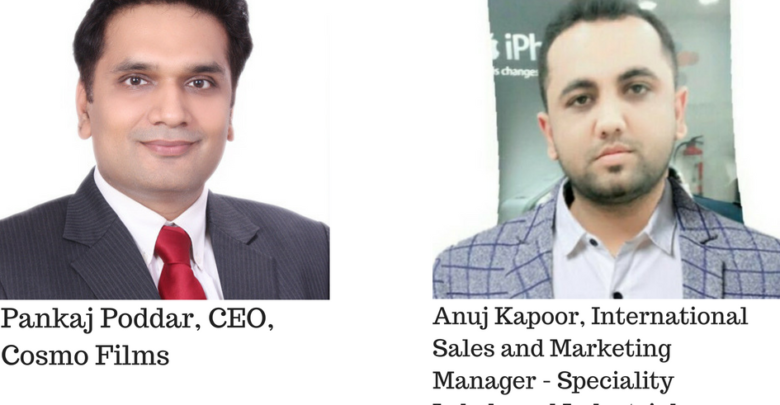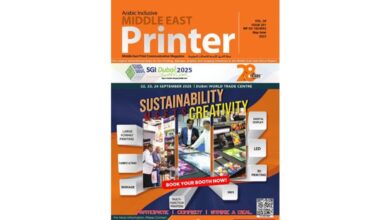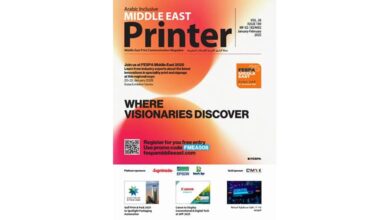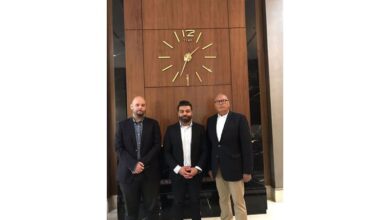Enhancing the Packaging Industry Through Top Notch Solutions

In a conversation with ME Printer, Pankaj Poddar, the CEO of Cosmo Films, and Anuj Kapoor, the International Sales and Marketing Manager for Speciality Labels and Industrial Films, talk about their company, the products and solutions they offer on the market and market trends in the region.
Tell us about Cosmo Films and its presence in the MEA region?
Pankaj Poddar: Established in 1981, Cosmo Films Limited today is a global leader in speciality films for packaging, lamination and labelling applications. Its films offerings include biaxially oriented polypropylene (BOPP) films, cast polypropylene (CPP) films and soon to be offered biaxially oriented polyethene terephthalate (BOPET) films.
Cosmo Films is a pioneer of BOPP film manufacturing and introduced the country to its commercial applications. Today, the company is the largest exporter of BOPP films from India and is also the largest producer of thermal laminating films in the world. Apart from the widest portfolio of speciality BOPP and CPP films, our customers recognise us for the customised innovation that we provide them as part of our strategic relationship and the customer-centric approach.
Cosmo has five state-of-the-art manufacturing facilities spread across India, the US (at Hagerstown, Illinois) and Korea (at Asan); and global channel partners in more than seventy countries. In India, our facilities are located at Waluj (Aurangabad), Karjan (Vadodara), and Shendra (Aurangabad).
The Middle East market is a large market for us especially for speciality films for packaging, lamination and labelling applications. Our increased engagements with brands, flexible packaging converters and channel partners have helped us to further grow our speciality films sales in this market.
What sort of products and solutions do you offer on the market?
Pankaj Poddar: Cosmo Films has the widest portfolio of BOPP and CPP based speciality flexible films for packaging, lamination and labelling segments. We are continuously innovating new products and their unique applications to stand out in the market. As an example, we recently introduced conduction retort lidding film for flavoured milk, juices, and so on, as well as the universal lidding film which can seal with any plastic material such as food trays, jams, sauces, butter, and so on.
On the lamination side, we have come up with black velvet film for premium lamination and in packaging, we have developed ultra-high barrier film as well as heat resistant BOPP film to replace polyester in reversely printed films. Some of our speciality products include high barrier films, overwrap films, velvet and black velvet thermal lamination films, scuff free and digital lamination films, PSA label face stock films, direct thermal printable films and synthetic paper. We are also committed to creating value for our customers, collaborating with them on projects, offering them research-oriented products and cost management.
Let us look at some of our speciality products in more detail:
Ultra High Barrier Films:
Transparent Films: These films are used in varied applications and include Aroma Barrier Films for coffee/tea and spices packaging; High Oxygen Barrier Films for biscuits packaging and High Oxygen and Aroma Barrier Films for ready to eat pack applications etc.
Metalized Films: It comprises of High Moisture Barrier Films for sandwich lamination in shampoo sachets, dry milk powder and powdered drinks sachets/packs where loss of moisture is a concern. It also includes High Moisture Barrier with high seal strength films for bulk packs needing moisture barrier and Ultra High Barrier films for foods with fatty contents such as dry fruits, chips, cream biscuits packs, and so on.
Velvet Lamination Films: As the name suggests, these are thermal lamination films offering velvety touch and feel and intense black colour along with rich velvet finish to the printed surface respectively. Apart from the soft and velvety touch and feel, these films give excellent scuff resistance and are suitable for UV spot lamination and foil stamping as well. Engineered on special matte base films, these films not only protect the printed surface but also enhance the aesthetics.
PSA Label Face Stock Films: Available in transparent, white and metalised variants, label stock films are used by the majority of the home care and personal care products around the globe for their self-adhesive label needs. These films also find usage in imparting functional and aesthetic appeal in beverage and pharmaceutical products. All the films meant for label face stock are Universal Printable films; which means that they can deliver superior print performance across diverse printing processes which include UV, flexography, gravure, letterpress and offset. The films are also compatible with all ink-based systems, such as UV, water-based, and solvent.
Synthetic Paper: It is a replacement of paper in applications where durability and longevity are desired. It is non-tearable, has moisture and chemical resistance and excellent lay flatness. It is printable with most available printing technologies which include wet and UV offset, wet and UV flexo, letterpress, screen, thermal transfer and most of the digital toner technologies. The versatility of synthetic paper is reflected in the vast number of applications where it can be used. This includes areas such as commercial printing, tags and labels, retail and packaging, identification and credentials and outdoors.
Today it is used primarily for printing visiting and ID cards, garment tags and marketing collaterals such as posters, banners, and so on. Going forward, all important documents like medical reports, educational certificates and land documents and instruction manuals could be printed on synthetic paper. Another important application of synthetic paper could be children and recipe books. Stationary items where longevity is essential such as maps, flip charts, and calendars could also be printed on this paper.
Tell us about your synthetic paper line?
Anuj Kapoor: We offer three types of synthetic papers, based on the printing technology in use. These include synthetic papers for offset, flexo, and digital. We are certified by ISO and we offer top-notch quality products on the market. I am visiting the UAE to engage with more and more customers. We do not have any exclusive distributors in the region, but we do work with some distributors on a need basis. We are already in talks with a distributor to cover this region.
What is the USP of synthetic papers over natural papers?
Anuj Kapoor: When you do a job through offset, usually in order for it to be non-tearable, you add adhesives and laminate it. With Synthetic papers, you just print on the papers – the papers already come with adhesives and lamination film on top of it. So you eliminate the cost of adhesives, film, manpower and machine. Our synthetic papers can be used for all sorts of printing such as offset, UV offset, flexo, UV flexo, Thermal Transfer, and so on. It is environment-friendly and is also recyclable.
Do you work directly with your clients or through channel partners?
Pankaj Poddar: We work both ways depending on the market demands. For packaging films, the requirements are volumetric and hence the direct approach to customers is preferred. In case of lamination film, we generally work through our channel partners as the customer base is large.
How big is the packaging market in the MEA region and how do Cosmo Films’ products add value?
Pankaj Poddar: The packaging market is significant in the MEA region and is growing at 5.5 percent CAGR. We are confident of further enhancing it through our innovative products and offering a wide range of speciality products for various packaging applications.
The packaging industry is constantly looking for solutions in the areas of the enhanced shelf life of the product and sustainability. Our BOPP films have a huge potential to fulfil these unmet needs of the industry. Future growth for BOPP is expected to come as more and more brands replace heterogeneous laminate structures (mostly involving PET and PE), with a BOPP-BOPP homogeneous laminate structure for easy recyclability. Another major area of growth would be BOPP based high barrier films to replace Alu Foils and other complicated laminate structures.
What sort of trends have you seen on the regional market when it comes to packaging, labelling and related industrial applications?
Pankaj Poddar: Some of the trends we have seen in the market include:
- Need for enhanced shelf life requirements for food packaging
- Need for lightweight packaging to reduce cost and waste
- Need to shift from wet lamination to thermal lamination
- Need for luxury packaging to offer rich aesthetics to the products
- Need for films replacing paper in the pressure sensitive label industry for aesthetics and longevity
- Shift from paper to synthetic paper for longevity
- Need for a homogeneous laminate structure in view of sustainability
Do you plan to participate or conduct any events in the MEA region?
Pankaj Poddar: We keep evaluating the events and exhibitions related to packaging, lamination and label industries in the region. If we find something relevant, we would definitely participate.
What milestones does Cosmo Films plan to achieve this year?
Pankaj Poddar: We have already made an announcement for setting up of a speciality BOPET line expected to be installed by end of the calendar year 2019. This is our first foray into PET-based products and will come with an investment of USD 55 million. As far as medium to long-term targets are concerned, we do keep a look out for expanding in related areas of growth and have already announced acquisitions of 34 acres of land in Aurangabad, Maharashtra and 11 acres land in Karjan, Gujarat close to our existing plants with expansion on our mind.
Will we hear about any new product launches from the company this year?
Pankaj Poddar: Cosmo Films believes in constant progression and we are regularly innovating and introducing a new range of products. Our R&D team is engaged in identifying technical (product/applications) growth areas; increasing the occupancy of value-adds in the products baskets and efforts towards downgauging in our products (reducing consumption of raw materials and fuel and thereby reducing our carbon footprint). Some of the products in the pipeline are:
- Metalised label film with glossy mirror finish which can be printed with high-speed flexo printing machines
- High metal bond CPP film, a new metalised film which gives good metal bonding resulting into good lamination bond
- High-density IML film for large mould size has stable static properties which enable this film to run more efficiently
- Conduction retort lidding film for flavoured milk, juices, and so on






Definitely, what a splendid blog and illuminating posts, I surely will bookmark your site.All the Best!
Thanks for the wonderful manual